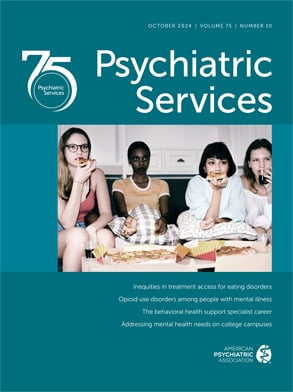Barry Blackwell, the editor of Treatment Compliance and the Therapeutic Alliance, reminds us that throughout medicine roughly 25 percent of inpatients and 50 percent of outpatients are not compliant with treatment. From this statistic alone, it is tempting to conclude that psychiatric practice would be so much easier and presumably more effective if our patients simply did what we told them to do.
Clearly, it is not that simple. Dr. Blackwell's book, volume 5 of a series of books on chronic mental illness, points out the complexity, reframing the issue of treatment compliance "at a moment in history when the shift from paternalism to consumerism has accelerated dramatically." Thus what we used to see as the patient's problem with compliance must now be viewed as the treatment dyad's problem within the context of the therapeutic alliance.
This book is divided into three parts covering successively, according to the editor, "the science, the art, and some special problems of the field." Part 1 reviews the literature on compliance research and has six other chapters on such topics as insight, cultural diversity in the treatment alliance, and decision-making capacity. This last chapter fails to cite the recent MacArthur Foundation treatment-competency studies, and while it gives an excellent, comprehensive review of the informed consent doctrine, it does so late in the chapter, making what comes first confusing.
Section 2, called Participants in the Alliance, is the most fun to read. Chapters on compliance from the perspectives of community mental health center administrators, consumers (by a psychiatrist-consumer Daniel Fisher), family members, pharmacists, and case managers provide a wonderful window on the complexities of the issues. For example, in "Case Managers and Compliance," Martha Hodge says, "Case managers have been implicitly (explicitly in some cases) expected to get people to take their medicines. Interestingly this important task has been relegated to the lowest paid and least trained staff." Section 2 also includes an intriguing chapter by Thomas Kuhlman on the concept of reactance, a social-psychological construct that decouples noncompliance "from both its negative definition and negative connotations."
Section 3, called People With Special Needs, covers compliance issues related to the elderly and to people with developmental disabilities, schizophrenia, bipolar disorder, and alcoholism. The editor do a great service by reprinting Kay Jamison's superb chapter on lithium compliance from the now-classic text
Manic-Depressive Illness, written with Frederick Goodwin (
1).
In this section…
The complexity of the concept of treatment compliance at a time of rapid movement from paternalism to consumerism is one aspect of this month's lead book review, written by Mark Munetz. Among many other books of special interest are three on different aspects of the addiction; one on "memory quest" that is not, in the reviewer's words, an antitrauma polemic; a book by Robert Klitzman on the lives of people with HIV and their patterns of adaptation and response; and an "essential quide" to group practice in mental health, recommended highly by reviewer Jay Pomerantz.
This book does an excellent job of pointing out the ongoing tension between paternalism and individual autonomy when discussing compliance and the treatment alliance. These are critical issues well recognized by all of us who work with people with severe and persistent mental illness. The majority of the 34 contributors come down clearly biased on the side favoring autonomy. In his own chapter called "The Physician Who Prescribes," Dr. Blackwell concludes, "To prescribe is often necessary but never sufficient. Coercion is ineffective and the concept of compliance is inadequate. Medications have become part of an alliance that embraces each person's beliefs, experience, and lifestyle."
And in their excellent chapter on "Power and Coercion in Mental Health Practice," authors Laurie Curtis and Ron Diamond cite a statement by Richard Surles: "We cannot at the same time be more libertarian and more paternalistic…. If we are to promote choice, we have to be prepared to accept consequences. And if we give priority to patient safety, we should give up the pretense of defending patient choice." Curtis and Diamond conclude that paternalism encourages our patients to settle for stability rather than growth and confuses "compliance with success."
Although I hardly disagree that individual autonomy should be an overarching value, the book as a whole too easily dismisses the possible benefits of paternalism, including coercion, for some people who have serious mental illness, persistently refuse treatment, and consistently lack the capacity to make informed decisions. The reader gets the impression that it is universally accepted that paternalism-coercion and recovery are mutually exclusive. While this view may be politically correct thinking these days, it is not clear that it has been shown to be true. There are individuals for whom recovery may not be possible without a period of (sometimes prolonged) beneficent paternalism.
Overall, Treatment Compliance and the Therapeutic Alliance is an excellent book and will be of interest to mental health professionals of all disciplines working with people with severe and persistent mental illnesses. The publisher's series on chronic mental illness, edited by John Talbott, from which this book comes includes earlier volumes on case management, helping families cope with mental illness, comorbid chronic mental illness and substance abuse, and public-sector managed care. Given the high quality of the current volume and the high caliber of the volume editors, I look forward to tracking down the rest of the series.

